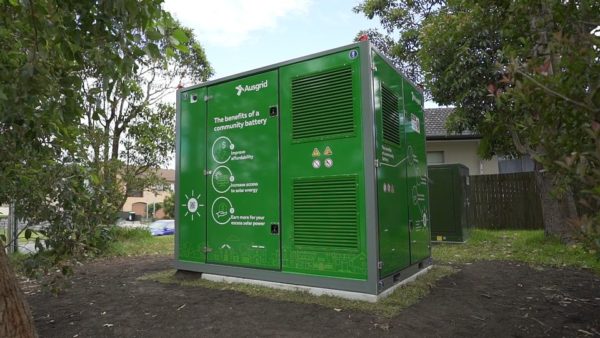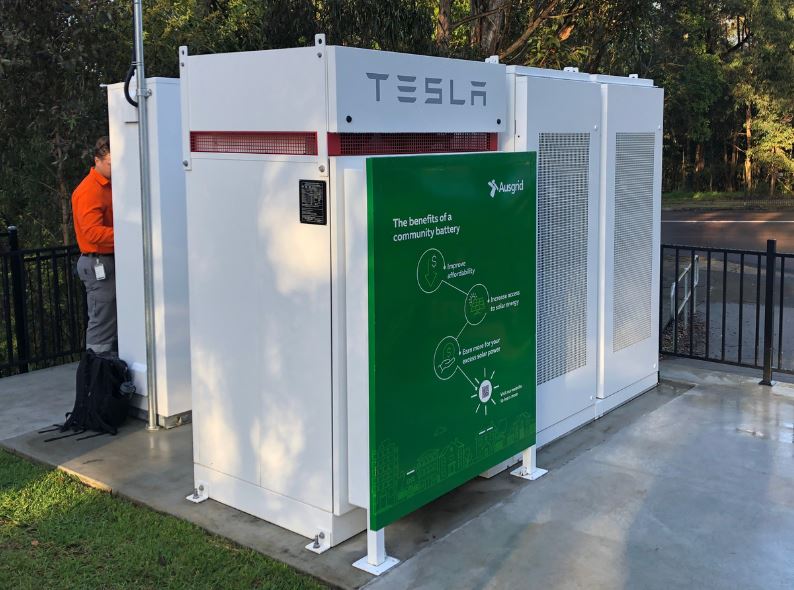Simply Energy has secured access to unused capacity from the community batteries, installed by Ausgrid as part of a trial that aims to help the network host more rooftop PV, and is aiming to use this to create additional value from the energy market, as well as provide Ausgrid with insights into how the batteries could be used and the value that could be created by a market partner.
Ausgrid has installed community batteries at three sites as part of a two-year trial which will allow the network operator to shift the way solar power is being utilised in New South Wales (NSW), ultimately allowing for more renewables on the grid, while also decreasing costs for consumers and stabilising local grids.
Batteries have been installed in the Sydney suburbs of Beacon Hill and Bankstown and at Cameron Park near Lake Macquarie in the Hunter region. Ausgrid is testing two different energy storage systems as part of the trial, including two Tesla PowerPack 2 batteries, which each deliver up to 130 kW of power and 232 kWh of storage, and a MTU Energy Pack QS which provides about 150 kW / 267 kWh of storage capacity.
Ausgrid said since the batteries were installed, they have been soaking up consumer-generated solar with customers benefiting from the virtual storage service, earning credits for renewable energy exported to the battery in the daytime and consumed from the battery when the sun goes down.
At the same time, Ausgrid has been testing the ability of the batteries to manage grid voltage and add further power capacity in areas with high solar penetration.
The agreement with Simply Energy, the retail branch of French energy giant Engie, will extend the benefits of the community batteries beyond just the trial participants to customers across the grid.
When not needed for network support, battery capacity will be made available to Simply Energy which will operate the batteries in the National Electricity Markey (NEM) in a move which Ausgrid expects will help to support the continued growth of renewable energy.

Image: Ausgrid
Simply Energy said a key part of the trial is to test how the three Ausgrid batteries can be used to ‘value stack’ by offering unutilised battery system capacity to a market partner for use in wholesale and frequency control markets.
Simply Energy Solutions General Manager Ryan Wavish said the company also aims to access additional value from the energy market by incorporating the community batteries into its existing Virtual Power Plant, which includes customers’ home batteries.
“We are excited … to explore the benefits of community batteries and their ability to provide valuable network services as well as generate returns through energy and ancillary services markets” Wavish said. “These assets will form an important part of our growing Virtual Power Plant fleet”.
Ausgrid Chief Customer Officer Rob Amphlett Lewis said the agreement is expected to provide crucial insights into how community batteries can be used by market partners and the potential value that could be unlocked in future projects.
“The ability to have community batteries participate in the energy market is the final piece of the puzzle for our trial and one that really demonstrates how the industry can work together to provide the storage services that are urgently needed to meet our net-zero goals,” he said.
“These batteries are secure and sophisticated enough to provide valuable market services while located to provide optimal customer benefits.”
Ausgrid’s community battery trial across the three locations is due to continue until the end of 2023.
This content is protected by copyright and may not be reused. If you want to cooperate with us and would like to reuse some of our content, please contact: editors@pv-magazine.com.









By submitting this form you agree to pv magazine using your data for the purposes of publishing your comment.
Your personal data will only be disclosed or otherwise transmitted to third parties for the purposes of spam filtering or if this is necessary for technical maintenance of the website. Any other transfer to third parties will not take place unless this is justified on the basis of applicable data protection regulations or if pv magazine is legally obliged to do so.
You may revoke this consent at any time with effect for the future, in which case your personal data will be deleted immediately. Otherwise, your data will be deleted if pv magazine has processed your request or the purpose of data storage is fulfilled.
Further information on data privacy can be found in our Data Protection Policy.